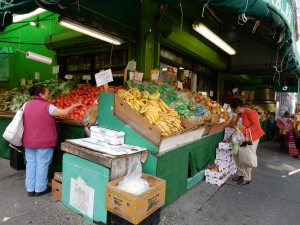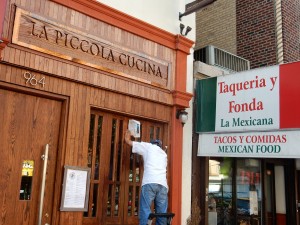 In a session about sustainable food systems, the expression “you are what you eat” took on new meaning with a presentation on urban food planning by Dr. Rosita Ilieva. Dr. Ilieva is a Post-Doctoral Research Fellow at the Tishman Environment and Design Center at The New School, where she teaches and researches urban food systems and sustainable cities in the Environmental Studies program. She also has earned a Ph.D. Cum Laude in Spatial Planning and Urban Development from the Polytechnic University of Milan.
In a session about sustainable food systems, the expression “you are what you eat” took on new meaning with a presentation on urban food planning by Dr. Rosita Ilieva. Dr. Ilieva is a Post-Doctoral Research Fellow at the Tishman Environment and Design Center at The New School, where she teaches and researches urban food systems and sustainable cities in the Environmental Studies program. She also has earned a Ph.D. Cum Laude in Spatial Planning and Urban Development from the Polytechnic University of Milan.
In her talk, entitled “The Urban Food Planning (R)evolution”, Dr. Ilieva offered the audience a new taste of the urban planning pie by demonstrating the value of understanding a city’s relationship with food in planning an efficient, equitable metropolis that meets its urban sustainability goals. Urban food planning takes a multidisciplinary approach that brings together planning, design, landscape, and architecture in order to understand the issues within the communities that make up a city, and inform the policies that address them. Dr. Ilieva pointed out that until relatively recently, food systems analysis had been focused only on the developing world and on rural areas. However, while it is still “a grass roots niche innovation,” urban food systems planning now examines the relationship between food and the city in a number of ways.

Food systems can help map “visual urban geography,” enabling planners to gain insights into such issues as local influences on obesity and diabetes, and food deserts among underserved populations. The analyses can identify ways that food retail outlets affect energy usage and lifestyle patterns of individual neighborhoods. It can help locate opportunities for rooftop gardens and localize sustainable and economical waste disposal and recycling efforts. Ultimately, the process can help to enable targeted infrastructure planning and resource and amenities development that support a balanced and sustainable city.
This new discipline has received much attention over the past 10 years, having been covered in over 100 publications across many disciplines. Urban food systems planning initiatives are underway in London, Toronto, Los Angeles, Milan and Amsterdam and include task forces, planning agencies, and food policy councils. Dr. Ilieva is hopeful that there currently exists a stable platform to advance this discourse through international knowledge sharing, but recognizes that “white spots” still exist. Currently, most activity focuses on a single food system aspect, such as retail, and funding is insufficient for “food system planning spaces at multiple scales.” Nevertheless, this burgeoning field offers a lot to chew on for planners of our cities of the future.
Leave a Reply
You must be logged in to post a comment.